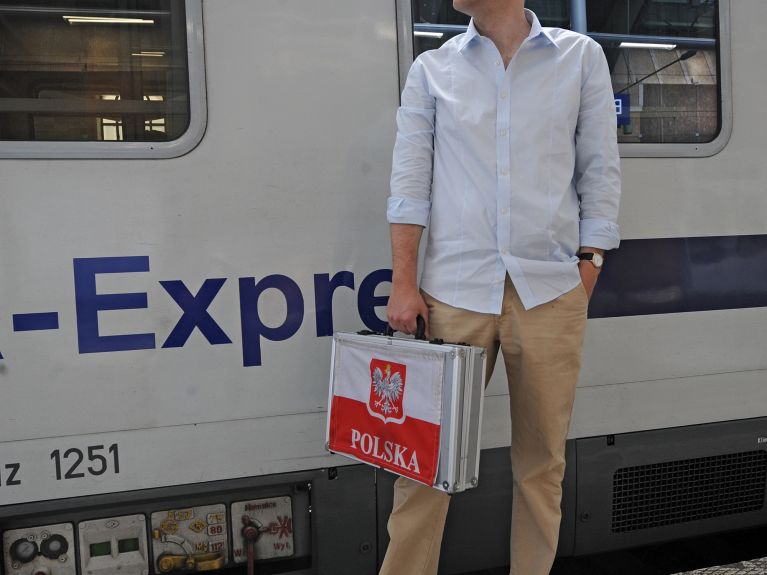“Visit Poland!”
As cabaret artist Steffen Möller lives part of the year in Germany and part in Poland he is familiar with relations between the two countries and the influence the weather has on them.

For almost 25 years German cabaret artist Steffen Möller has spent part of the year in Poland. In interview with deutschland.de he tells us how he rates German-Polish relations, and how the weather affects them.
Mr Möller, German Polish relations are not that great right now. There are numerous disagreements, for example on the issue of migrants and on EU policies in general. Are you worried about the way things are developing?
Yes and no. I believe the political tensions are only temporary, and that in the end the grassroots level will prevail. After all, there are 400,000 German-Polish marriages and partnerships and an extraordinarily large group of German-Polish children who speak both languages perfectly. I’m just writing a book about this niche of society and in recent months I’ve been conducting many interviews with such couples. From my own experience I can say: We are on the right path, and a German-Polish fusion is just a matter of time. But no matter how much politicians are at each other’s throats: In 100, 200 years we’ll be the best of friends.
So political tensions have no impact on your everyday life?
Oh but they do, there are a whole lot of irritations. Sometimes Germans in Poland are treated unpleasantly if they say speak German on the tram. That happens now and again, maybe once a month. But there are many Polish people who are treated unpleasantly in Germany – and have always been treated badly. I can only warn against looking for a cheap excuse not to travel to Poland. Especially those people who have never visited Poland – and that’s around 70% of all Germans – are happy for any excuse. So I say: Fair enough, Polish politics are not that hot at the moment but go visit the country anyhow.
Dieses YouTube-Video kann in einem neuen Tab abgespielt werden
YouTube öffnenThird party content
We use YouTube to embed content that may collect data about your activity. Please review the details and accept the service to see this content.
Open consent formWhat needs to happen for Germany and Poland to move closer together politically as well?
I see things somewhat differently, after all, I’m not a politician. For 16 years I’ve been performing German-Polish cabaret and even in those phases when everything was going smoothly politically speaking there were still many prejudices and clichés on both sides. You might say I’m working in the longer term to improve German-Polish relations. And incidentally, Polish people tend to know a little more about Germany than we do about Poland.
As a cabaret artist I enjoy the privilege of being able to tell jokes about the other side.
What’s the reason for that?
The main reason is that 30% of Polish students learn German. Poland is the country with the most students of German worldwide – there were some 2.2 million in 2017. In Germany at the very most 10,000 students learn Polish. That produces a huge imbalance. But what really needs to change for all German and Polish people to visit each other more often is that the weather needs to get better. The real reason why the Germans and the Poles largely ignore each other is not history, not the language and not politics, it’s the weather. Polish people feel no inclination to spend their holidays in Germany, because it has the same kind of weather. And that’s no different for Germans. And a second factor curbs our curiosity: We are neighbours. But today people need to travel 5,000 km at least in order to consider it a decent holiday. I sometimes get the impression it would be easier promoting Brazil or Japan in Poland.
Can you get away with things as a cabaret artist that diplomats are unable to do?
I enjoy the privilege of being able to tell jokes about the other side, and the other side also has to laugh at them. Jokes about Poland? I wouldn’t advise a German politician to tell them, that would ruffle too many feathers. As a cabaret artist I operate in a different medium.
The best thing you can do when you travel to a foreign country is learn the language. That earns you the most bonus points. But as far as I know there is no top politician at the moment capable of speaking Polish. Only Mats Hummels can count to 10 in Polish, he once gave me a demonstration.
Town twinning agreements are worth their weight in gold.
You often get invitations from town twinning agreement associations. How would you rate their importance?
At one time I just couldn’t see the need for such town twinning agreements. That may be the case to some extent for the Franco-German relationship, where things are going well at the moment. As regards Poland I can only say: town twinning agreements are worth their weight in gold, because they bring so many people together at a local level. And there are some really excellent agreements: reciprocal visits between schools, choirs, orchestras, or brass bands. Every year hundreds of people are involved in such exchanges.
You divide your time between Germany and Poland. What does home mean to you?
Yes, what is home? Perhaps the place where people are similar to myself. Then home to me is the Eurocity train between Berlin and Warsaw. I use this train several times a month to travel between the two cities. And you see lots of people there like me who are commuters between two (or more) worlds. They can speak both languages and know all the jokes about Polish thieves and German Nazis. I feel at ease there, and if I’m lucky I even occasionally hear a new joke.
Interview: Kathrin Noll


